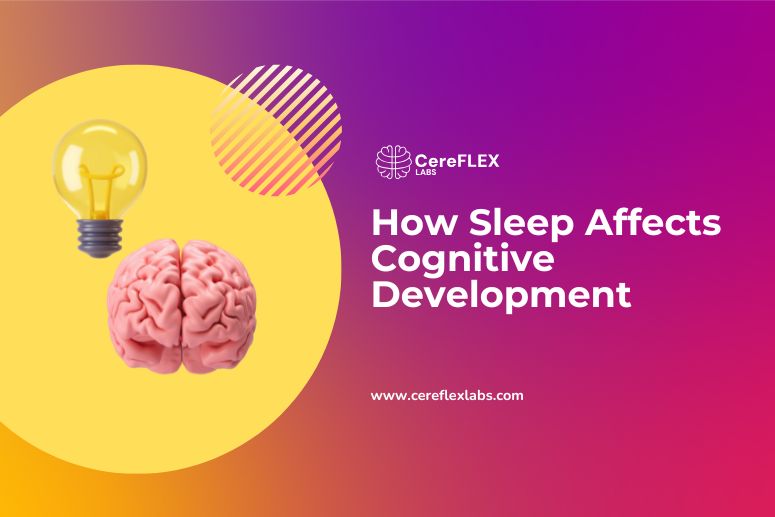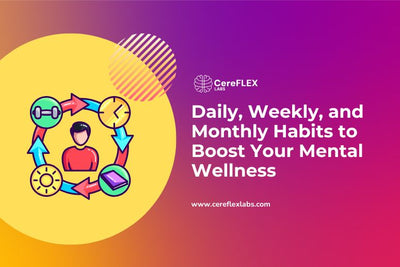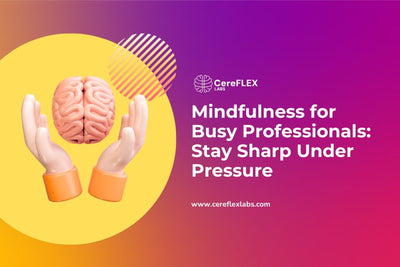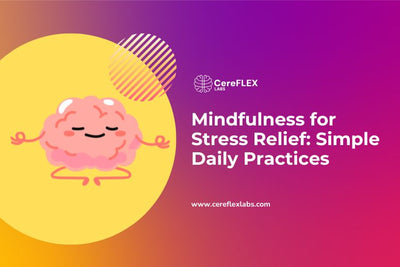Sleep is one of the most powerful and underused tools for shaping how our brain grows, adapts, and functions. While your body rests, your brain goes to work—strengthening memories, regulating emotions, clearing waste, and forming the neural connections that help you learn, focus, and problem-solve.
From infancy to old age, sleep fuels brain development and long-term cognitive health. High-quality rest—especially deep sleep and REM stages—plays a critical role in everything from memory consolidation to emotional balance.
When sleep is cut short or disrupted, the brain struggles to keep up. We may feel foggy, forgetful, emotionally reactive, or unfocused—sometimes after just one bad night. But when we consistently prioritize good sleep, we support sharper thinking, faster learning, and stronger mental resilience.
Read this guide to see how sleep contributes to brain health across all age groups, along with simple ways to sleep better and think clearer.

What is cognitive development?
Cognitive development refers to how our brain learns, stores, and uses information throughout life. It includes vital abilities such as memory, attention, language, reasoning, learning, and executive function (our ability to plan, focus, and manage tasks or behaviour).
While most people associate cognitive development with childhood, the brain continues to evolve well into adulthood. This lifelong adaptability is known as neuroplasticity—the brain's ability to rewire itself in response to new experiences or injuries.
- In children and teens, cognitive development lays the foundation for skills like language, logic, emotional control, and academic learning.
- In adults, it's about refining those skills, staying mentally agile, and building emotional intelligence.
-
In older adults, it becomes essential for preserving memory, processing speed, and preventing decline.
One key enabler of strong cognitive development at all life stages? Sleep. Let’s explore why.

Why Sleep Matters
Sleep isn’t just downtime—it’s a deeply active process that allows the brain to restore, reorganize, and grow. During sleep, especially in deep and REM stages, the brain performs critical maintenance that supports everything from emotional balance to memory storage and learning.
Two key functions take place overnight:
- Neural Repair & Housekeeping: The brain clears waste, repairs cells, and rebalances chemical messengers like neurotransmitters, which are essential for cognitive function.
- Pathway Strengthening: In both children and adults, sleep strengthens the neural pathways formed during waking hours—essential for skill acquisition and long-term retention.
Perhaps most fascinating is the role of neurogenesis—the creation of new brain cells. This process, which occurs in areas like the hippocampus (central to memory), relies heavily on high-quality sleep. When sleep is cut short or disrupted, neurogenesis slows, making it harder to form new memories or adapt to new challenges.
In essence, sleep acts like overnight brain training—laying down the circuits for sharper cognition, faster learning, and emotional resilience.
How Sleep Works – A Simple Guide to Sleep Cycles
Sleep isn’t a single state; it’s a repeating cycle of distinct stages that your brain moves through several times each night. Each of these stages serves a unique role in helping your brain and body reset, recharge, and grow.
There are five key stages: Wake, N1, N2, N3, and REM. The first three (N1 to N3) make up non-REM sleep, while the final stage is REM sleep (Rapid Eye Movement). A full sleep cycle lasts roughly 90 to 110 minutes, and most people complete 4 to 5 cycles per night.

Wake (Stage W)
Before falling asleep, your brain is active and alert. Fast-moving beta waves dominate, especially when your eyes are open. As you begin to relax and close your eyes, slower alpha waves appear, signalling the shift toward sleep.
N1 – Light Sleep (5%)
This is the lightest phase of sleep and typically lasts 1–5 minutes. Theta waves begin to emerge, and your body starts to disconnect from its environment. You can be awakened easily during this stage.
N2 – Deeper Sleep (45%)
In this longer stage, heart rate slows, body temperature drops, and brain activity shows sleep spindles and K-complexes—both linked to learning and memory. N2 deepens with each cycle and accounts for nearly half of your total sleep time.
N3 – Deep Sleep (25%)
Also called slow-wave sleep, this is the most restorative phase. Delta brain waves dominate, and the body undergoes important processes like muscle repair, immune support, and cell regeneration. Deep sleep also plays a key role in neurogenesis and long-term memory formation.
REM Sleep (25%)
During REM sleep, the brain becomes highly active while the body remains physically still—except for rapid eye movements and breath changes. This is the stage most associated with dreaming. REM helps with emotional processing, creativity, and the consolidation of procedural memory.
Sleep Architecture and Circadian Rhythms
A full night of sleep isn’t static—it follows a structured pattern known as sleep architecture, which is controlled by your circadian rhythm (your body’s internal clock). This natural rhythm regulates sleep-wake cycles and is closely tied to light exposure and melatonin production.
Sleep Architecture
A typical sleep cycle progresses like this:
Wake → N1 → N2 → N3 → N2 → REM, then the cycle repeats.
As the night goes on:
- Deep sleep (N3) dominates the early cycles.
- REM sleep becomes longer and more prominent in later cycles, especially just before waking.
This structure ensures both physical repair (during deep sleep) and cognitive restoration (during REM sleep).
Circadian Rhythm and Melatonin
Your circadian rhythm helps signal when it’s time to be awake or asleep. In the evening, darkness triggers the release of melatonin, a hormone that makes you feel sleepy. Exposure to bright lights (especially screens) before bed disrupts this rhythm and can delay sleep onset.
Jet lag, night shifts, and inconsistent bedtimes can also misalign your circadian rhythm, affecting the balance and quality of sleep cycles.
When your sleep architecture is preserved and circadian rhythms are stable, your brain gets the full benefits of restorative sleep—boosting cognitive performance, emotional stability, and memory.
What Happens to the Brain During Sleep
Sleep is not a passive state—it’s a time of intense neurological activity. During different sleep stages, the brain processes, organizes, and even discards information to support memory, focus, and emotional health.

Learning and Memory
Sleep—especially [deep sleep (N3)] and REM—is essential for memory consolidation. This process helps transfer short-term memories into long-term storage. Research shows that:
- If deep sleep is disrupted, your ability to learn new information drops significantly.
- REM sleep helps stabilize these memories so they aren’t lost or overwritten by new experiences.
Unlearning and Forgetting
Sleep also helps the brain "declutter." During non-REM stages, the brain filters out unimportant or outdated information to maintain mental clarity. This supports better neuroplasticity by preserving space and flexibility for new learning.
REM and Non-REM Work Together
Think of non-REM sleep as a “brain editor” and REM as the “file saver.” Light non-REM stages help the brain build new connections. REM sleep then strengthens and stabilizes those connections, reinforcing learning while avoiding overload.
Forgetting Dreams
The brain actively helps us forget dreams by releasing a chemical called MCH (melanin-concentrating hormone) during REM. This selective forgetting helps us focus on relevant information once we wake up.
Pain Relief and Emotional Balance
Deep sleep modulates pain and restores emotional control:
- Without enough sleep, the somatosensory cortex (which processes pain) becomes hyperactive.
- The nucleus accumbens, which controls dopamine release, becomes sluggish—dulling your ability to feel pleasure or relief.
- The medial prefrontal cortex, which keeps anxiety in check, becomes less active—raising anxiety levels by up to 30% after just one night of poor sleep.
Good non-REM sleep helps reset these brain systems, improving mood and resilience.
How does lack of sleep affect cognitive performance?
Sleep deprivation—whether from a single sleepless night or chronic undersleeping—can impair the brain’s ability to function across nearly every cognitive domain. Both total sleep deprivation and partial sleep restriction (more common in daily life) lead to measurable mental decline.1
Short-Term Cognitive Effects
Even one night of poor sleep can lead to:
- Microsleeps & Drowsiness: Brief, uncontrollable lapses into sleep, often without awareness.
- Reduced Attention: Mental processing slows, making it harder to stay focused—similar to mild intoxication.
- Lower Adaptability: Difficulty adjusting to new information or problem-solving on the fly.
- Emotional Disruption: Trouble interpreting emotional cues and making sound decisions.
-
Poor Judgment: Increased risk-taking and reduced learning from mistakes.
Long-Term Cognitive Effects
Chronic sleep deficits can lead to:
- Weakened Memory: Ongoing disruption of both factual and skill-based memory consolidation.
- Higher Dementia Risk: Deep sleep clears brain toxins, including beta-amyloid—a compound linked to Alzheimer’s. Without sufficient sleep, this cleanup doesn’t happen efficiently.
- Declining Executive Function: Impaired ability to plan, organize, and regulate behaviour over time.
Lack of sleep doesn’t just make you feel tired—it slowly erodes your ability to think clearly, learn efficiently, and manage stress effectively.
Age-Based Sleep Needs for Brain Development
Our brains require different amounts and types of sleep depending on our stage of life. While the need for REM and deep sleep remains consistent in importance, total sleep requirements shift as we age.
Babies (0–2 years)
Sleep Needed: 12–17 hours per day
Why It Matters: Infants spend nearly 50% of their sleep in REM, which is essential for rapid brain development and neural connection-building. Lack of sleep during this stage may hinder emotional and cognitive milestones.
Children & Teens (3–18 years)
Sleep Needed: 9–13 hours for children; 8–10 hours for teens
Why It Matters: Sleep supports attention, emotional control, and academic learning. Teens, in particular, experience major shifts in circadian rhythm, making sleep consistency critical.
Adults (18–64 years)
Sleep Needed: 7–9 hours
Why It Matters: Sleep improves focus, stress response, and ongoing neuroplasticity, allowing adults to adapt, learn, and retain knowledge effectively.
Older Adults (65+)
Sleep Needed: 7–8 hours
Why It Matters: Though sleep quality often decreases with age, maintaining deep sleep and REM is crucial for preventing memory loss and supporting long-term cognitive performance.

Building a strong foundation for brain health begins with consistent, high-quality sleep. While everyone’s needs may vary slightly, the following evidence-based strategies can help enhance sleep and cognitive performance:
Stick to a Consistent Sleep Schedule
Going to bed and waking up at the same time—even on weekends—helps regulate your circadian rhythm, leading to deeper and more restorative sleep cycles.
Create a Sleep-Friendly Environment
Keep your bedroom cool, quiet, and dark. Blackout curtains, white noise, and a comfortable mattress can make a big difference. Avoid screens and bright lights an hour before bed to prevent melatonin suppression.
Pay Attention to Food and Drink
Avoid caffeine, alcohol, and heavy meals before bed. These can interfere with both falling and staying asleep. Instead, opt for a light snack rich in magnesium or try herbal teas known to support melatonin production.
Get Daylight and Stay Active
Daily physical activity and natural sunlight exposure improve sleep quality. Just avoid vigorous workouts too close to bedtime, as they may delay sleep onset.
Manage Stress and Screen Time
Journaling, deep breathing, or light stretching before bed can lower stress and promote relaxation. Limit exposure to stressful media or emails at night.
Use Sleep Supplements If Needed
Natural, non-habit-forming options like CereFlex PM can help improve sleep onset and depth. This formulation supports nighttime brain recovery while promoting calm and balance.
Support Smarter Days and Deeper Nights with the CereFlex AM/PM Protocol
Improving cognitive performance begins with a strong sleep-wake cycle—and that’s where the CereFlex Labs AM/PM Brain Supplement Package comes in. Designed to work in harmony with your body’s natural rhythms, this two-part system supports both daytime mental clarity and restful, uninterrupted sleep at night.
AM Formula – Energy, Focus & Mental Agility
The AM blend features key nootropics like L-Tyrosine, Rhodiola rosea, and Panax ginseng to help boost dopamine and norepinephrine levels. These ingredients enhance focus, alertness, and cognitive performance—without overstimulation or energy crashes.
PM Formula – Relaxation, Sleep & Overnight Brain Support
The PM formula includes calming agents such as Magnesium and Ginkgo biloba. These ingredients promote deeper sleep, encourage mental calm, and support the overnight brain processes linked to neurogenesis and memory consolidation.
What Makes CereFlex Different
✔︎ Science-led formulation: Developed by clinical experts based on over a decade of neuroscience research.
✔︎ Health Canada–approved: Every product carries a Natural Product Number (NPN) for safety and effectiveness.
✔︎ Round-the-clock support: Carefully formulated to align with your body’s natural rhythms—sharpening your focus by day and calming your mind at night.
For those experiencing sleep-related brain fog, mood shifts, or memory dips, CereFlex offers a thoughtful, evidence-based approach.
Conclusion
Sleep isn’t just downtime—it’s your brain’s most productive time. From forming memories and managing emotions to boosting focus and learning capacity, quality sleep fuels cognitive growth at every age.
Understanding how your sleep cycles impact brain function helps you make smarter choices: building healthier routines, protecting your circadian rhythm, and using tools that promote deep, restorative rest.
Helping your child grow or trying to stay on top of your own game? Either way, sleep is one of the smartest things you can invest in.
Looking for extra support? The CereFlex AM/PM Protocol is thoughtfully designed to align with your natural rhythm—boosting mental clarity by day and encouraging deeper rest by night.






